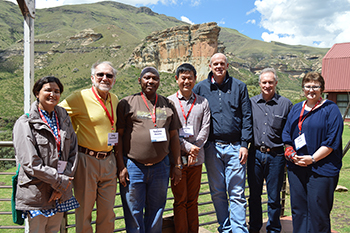
From the left are Drs Reetu Sogani (India),
Greg Greenwood (US-Switzerland), Teboho Manchu
(Acting Campus Principal), Drs Jianchu Xu (China),
Henri Rueff (Switzerland), Glen Taylor (Senior Director:
Research Development), and Elsa Crause
(Campus Vice-Principal: Academic and Research).
The University of the Free State’s Afromontane Research Unit (ARU), which is situated on the Qwaqwa Campus, has the potential to produce some of the world’s best and dynamic young researchers. This is the view of Dr Henri Rueff, who was one of the keynote speakers during the recent ARU Colloquium hosted at Golden Gate in the Eastern Free State.
Dr Rueff, a geographer and environmental economist from the Universities of Basel and Bern in Switzerland, was referring to no less than ten Qwaqwa Campus postgraduate students who made oral and poster presentations during the inaugural international colloquium.
“You have some of the world’s most motivated and highly skilled students who have the courage to stand in front of extremely critical scientists from all over the globe – and that must be commended,” he said.
Also talking about the students at the colloquium, was Dr Reetu Sogani from India, who said that her first trip to South Africa did not disappoint. “This colloquium was a very good learning experience for me as I had the opportunity to interact with brilliant and young scientists from this part of the world,” she added. In closing the colloquium, the Senior Director: Research Development, Dr Glen Taylor, committed the UFS to the success of the unit.
“The ARU will strengthen the research output of the campus. But most critically, it is setting the research agenda for the Qwaqwa Campus, and for the institution at large, to address the challenges that the surrounding mountain communities are faced with,” he said.